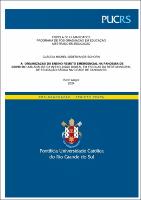| Share record |


|
Please use this identifier to cite or link to this item:
https://tede2.pucrs.br/tede2/handle/tede/11375| Document type: | Dissertação |
| Title: | A organização do ensino remoto emergencial na pandemia de CovidCovid-19 : uma análise da in/exclusão digital em escolas da rede municipal de educação básica na cidade de Canoas/RS |
| Author: | Schorn, Cláudia Micheli Sidervande  |
| Advisor: | Ferraro, José Luís Schifino |
| Abstract (native): | A presente investigação tem o objetivo de analisar como a organização do ensino remoto emergencial e as limitações no acesso às tecnologias digitais podem estar relacionadas aos processos de ensino e aprendizagem dos estudantes das escolas da Rede Municipal de Educação de Canoas durante a pandemia da Covid-19. No que concerne aos aspectos metodológicos, o estudo insere-se em um paradigma qualitativo por tratar-se de uma pesquisa narrativa do tipo estudo de caso múltiplo. Como instrumentos de produção de dados, foram utilizadas entrevistas semiestruturadas individuais, realizadas com os gestores e professores de quatro escolas municipais de Canoas, Rio Grande do Sul, bem como a aplicação de um questionário para levantamento de perfil dos participantes. Com base nos dados produzidos por meio das entrevistas, três categorias gerais foram encontradas e organizadas em duas subcategorias cada, são elas: (i) Incertezas relacionadas à modalidade de ensino; (ii) Organização didática e pedagógica; (iii) Relação famílias e escola. Desta forma, a partir das análises dos resultados foi possível evidenciar que a organização do ensino remoto emergencial nas escolas públicas resultou em processos de in/exclusão digital marcados principalmente por um sistema educacional neoliberal e pelo seu contínuo processo de desmantelamento e sucateamento da educação pública, que, durante a sindemia, se intensificou com a implementação verticalizada do ensino remoto, sem as devidas discussões e considerações das diferentes realidades dos alunos e suas condições de conectividade. Isso impactou negativamente o aprendizado dos estudantes, em razão da falta de políticas públicas educacionais voltadas à conectividade digital, comprometendo o acesso ao direito à educação. |
| Abstract (english): | The present investigation aims to analyze how the organization of emergency remote learning and the limitations in access to digital technologies may be related to the teaching and learning processes of students in the Municipal Education Network schools of Canoas during the Covid-19 pandemic. In terms of methodological aspects, the study is situated within a qualitative paradigm, as it involves a narrative inquiry using a multiple case study approach. Data production instruments included individual semi-structured interviews with administrators and teachers from four municipal schools in Canoas, along with a questionnaire to gather participant profiles. Based on the data produced through the interviews, an analysis of the records was conducted, leading to the systematization of the discourses and the creation of a thematic framework encompassing three general categories, each subdivided into two subcategories. These categories are: Uncertainties related to the teaching modality: Regarding the functioning of schools during the pandemic and the applicability of remote learning in public schools; Didactics and Pedagogy: Didactic and pedagogical organization of classes during emergency remote learning and the connectivity to the internet and digital devices for access to online classes; and finally, Family-School Relationships: The organization of students and families for access to remote learning and the lack of family support and engagement in guiding students through the remote learning process. Thus, based on the analysis of the results, it was possible to highlight that the organization of emergency remote learning in public schools resulted in processes of digital inclusion/exclusion, primarily marked by a neoliberal educational system and its continuous process of dismantling and devaluing public education. During the syndemic, this process was intensified by the top-down implementation of remote learning without the necessary discussions and considerations of the diverse realities of students and their connectivity conditions. This negatively impacted students' learning due to the lack of educational public policies aimed at digital connectivity, thereby compromising their right to education. |
| Keywords: | Educação Básica Pandemia de Covid-19 In/exclusão Ensino Remoto Emergencial Tecnologias Educacionais |
| CNPQ Knowledge Areas: | CIENCIAS HUMANAS::EDUCACAO |
| Language: | por |
| Country: | Brasil |
| Publisher: | Pontifícia Universidade Católica do Rio Grande do Sul |
| Institution Acronym: | PUCRS |
| Department: | Escola de Humanidades |
| Program: | Programa de Pós-Graduação em Educação |
| Access type: | Acesso Aberto |
| Fulltext access restriction: | Trabalho não apresenta restrição para publicação |
| URI: | https://tede2.pucrs.br/tede2/handle/tede/11375 |
| Issue Date: | 5-Apr-2024 |
| Appears in Collections: | Programa de Pós-Graduação em Educação |
Files in This Item:
| File | Description | Size | Format | |
|---|---|---|---|---|
| DIS_CLÁUDIA_MICHELI_SIDERVANDE_SCHORN_COMPLETO.pdf | CLÁUDIA_MICHELI_SIDERVANDE_SCHORN_DIS | 1.32 MB | Adobe PDF |  Download/Open Preview |
Items in DSpace are protected by copyright, with all rights reserved, unless otherwise indicated.




